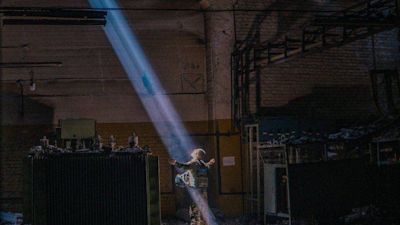More than 260 fighters evacuated from besieged Azovstal steel plant

With Moscow's plans for those evacuated still unclear, the fight to return them safely may be just about to begin - as Correspondent Rachel Younger reports
(Picture credit: Dmitry Kazatsky from the Ukrainian National Guard's Azov Special Forces Regiment)
More than 260 Ukrainian fighters, including those badly wounded, have been evacuated from the Azovstal steel plant in Mariupol and taken to areas under Russia's control.
Branded "heroes of our time" by the General Staff of Ukraine's Armed Forces, scores of troops have been trapped in the bombed remains of the giant plant for 82 days.
Azovstal served as the last stronghold of resistance in the shattered port city.
Ukraine's Deputy Defence Minister Anna Malyar said that on Monday, 53 seriously wounded fighters were taken to a hospital in Novoazovsk.
An additional 211 fighters were evacuated to Olenivka through a humanitarian corridor and an exchange would be worked out for their return home, she said, adding up to 264 fighters in total.
However, the Ukrainian military reports Russian troops kept up their blockade of the plant on Tuesday.
The battle for Mariupol's Azovstal steel works is a story of resistance against the odds, reports John Ray live from Dnipro, Ukraine
The army’s General Staff said in a post on its official Facebook profile that “in Mariupol, the enemy concentrated its main efforts on blocking our units in the area of the Azovstal plant.”
Ukrainian authorities did not disclose the number of fighters who remain in the steel mill.
Those who have been evacuated will be interrogated, Russia’s main federal investigative body has said, as part of its probe into alleged “crimes by the Ukrainian regime against the civilian population” in Ukraine’s industrial east.
Russia’s Investigative Committee said in a Telegram post that “Russian investigators will identify the nationalists (and) test whether they have been involved in crimes committed against the civilian population.
"The information obtained during interrogations will be compared with other data available in records pertaining to criminal cases.”
It did not provide any additional information regarding the location or legal status of the Ukrainian fighters.
Ludmila’s son has been underneath the steel works, where he has had his leg amputated. They’ve had “no food, no water, no medicine”, she said.
She’s a bit calmer now because she hopes he was one of those on the evacuation buses but is still fearful as the fighters have been taken to areas under Russia's control. “But still I just wish there was someone who could guarantee his safety,” she told ITV News.
“So they won’t go missing, so nothing will happen to them.”
Lily Stupina, whose childhood sweetheart and husband is in there too, said they have lost around “20 or 30 kilograms.”
“We have maybe a kind of hope, a little kind of hope,” she said.
“But we don’t trust Russia at all. We don’t know what to feel, how to feel and what to think.”
Why is the evacuation a major milestone?
Aside from the steel mill, the besieged city of Mariupol is under complete Russian control.
The full capture of Azovstal would be significant for Russia, as it would give Moscow its biggest victory of the war yet and could help free up forces for offensive action elsewhere in eastern Ukraine, a key focus of Russia's following a series of setbacks
Russia called the operation a mass surrender. The Ukrainians avoided using that word, but said the garrison had completed its mission.
The commander of the Azov Regiment, which led the defence of the plant, said the "mission" had ended with as many lives saved as possible. “Absolutely safe plans and operations don’t exist during war,” Lieutenant Colonel Denis Prokopenko said.
Meanwhile, Ukraine's President Volodymyr Zelenskyy said the evacuation to separatist-controlled territory was done to save the lives of the fighters who have spent weeks underground. He added that the “heavily wounded” were getting medical help. “Ukraine needs Ukrainian heroes to be alive. It’s our principle,” Mr Zelenskyy said.
"The work continues to bring the guys home and it requires delicacy and time."
How will this affect the outcome of the war? Rachel Younger explains
After nightfall on Monday, several buses pulled away from the steel mill accompanied by Russian military vehicles. There was no immediate word on whether the wounded would be considered prisoners of war.
Oleksandr Danylyuk, a Ukrainian former national security chief and finance minister, told the BBC those evacuated should be swapped for Russian prisoners.
However, Vyacheslav Volodin, speaker of the lower house of the Russian parliament, said there are “war criminals” among the plant defenders and they should tried, rather than exchanged.
Mariupol has seen some of the worst fighting since Russia invaded Ukraine in February, with hundreds of civilians only recently finding safety and many others dying.
Want a quick and expert briefing on the biggest news stories? Listen to our latest podcasts to find out What You Need To know